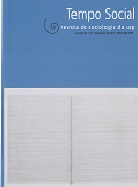O spatial turn: para uma sociologia do espaço
DOI:
https://doi.org/10.1590/S0103-20702013000200002Abstract
Este artigo tem como objetivo conferir plausibilidade ao conceito sociológico do espaço como disposição relacional de seres e bens. Como os processos da globalização também interferem nos modos de vivenciar o espaço, a Sociologia vê-se obrigada a repensar sua conceituação. Em termos metodológicos, oporemos duas posições contrárias: teoremas materialistas que partem da estrutura espacial, de um lado, e abordagens orientadas na prática e que partem da ação, de outro. Como conclusão, com referência à teoria da estruturação de Anthony Giddens, apresentamos a proposta de uma síntese das duas abordagens. Dessa forma, torna-se possível uma teoria do espaço que não atribui ao espaço forças essencialistas, nem o reduz a meras sequências de ação.
Downloads
Literaturhinweise
Alpsancar, Suzana et al. (2011), Raumprobleme: Philosophische Perspektiven. München, Wilhelm Fink.
Berking, Helmuth. (1998), “Global flows and local cultures: Über die Rekonfiguration sozialer Räume im Globalisierungsprozeß”. Berliner Journal für Soziologie, Berlin, 8 (3): 381-392.
Bourdieu, Pierre. (1991), “Physischer, sozialer und angeeigneter physischer Raum”. In: Wentz, Martin (org.). Stadt-Räume: Die Zukunft des Städtischen. Frankfurt a. M./New York, Campus, pp. 25-34.
Bryant, Christopher & Jary, David. (2001), “Anthony Giddens: a global social Theorist”. In: (orgs.). The contemporary Giddens: social theory in a globalizing age. Basingstoke, Palgrave, pp. 3-39.
Cresswell, Tim. (2004), Place: a short introduction. Malden, MA, Blackwell Pub.
Döring, Jörg & Thielmann, Tristan. (2008), Spatial turn: Das Raumparadigma in den Kultur- und Sozialwissenschaften. Bielefeld, Transcript.
Eckert, Andreas. (1996), “‘Unordnung’ in den Städten: Stadtplanung, Urbanisierung und koloniale Politik in Afrika”. In: Rothermund, Dietmar (org.). Periplus: Jahrbuch für außereuropäische Geschichte. Münster, Lit, pp. 1-20.
Fenster, Tovi. (1999), “Space for gender: cultural roles of the forbidden and the permitted”. Enviroment and Planning D: Society and Space, 17: 227-246.
Frehse, Fraya. (2013a), “Zeiten im Körper: Der Beitrag der Lefebvre’schen Methode für die (lateinamerikanische) Stadtforschung”. In: Huffschmid, Anne & Wildner, Kathrin (orgs.). Stadtforschung aus Lateinamerika. Bielefeld, Transcript
Verlag, pp. 145-169.
. (2013b), “Os tempos (diferentes) do uso das Praças da Sé em Lisboa e em São Paulo”. In: Fortuna, Carlos & Leite, Rogerio Proença (orgs.). Diálogos urbanos: territórios, culturas, patrimónios. Coimbra, Almedina, pp. 124-173.
. (no prelo), “In search of difference ‘in and through’ São Paulo: the regressive-progressive method”. In: Moravánsky, Akos, Schmid, Christian & Stanek, Lukasz (orgs.). After the urban revolution: applying Henri Lefebvre in urban research and architecture. London, Ashgate.
Giddens, Anthony. (1988), Die Konstitution der Gesellschaft: Grundzüge einer Theorie der Strukturierung. Frankfurt a. M./New York, Campus.
. (1989), “A reply to my critics”. In: Held, David & Thompson, John (orgs.).
Social theory of modern societies: Anthony Giddens and his critics. Cambridge, Cambridge University Press, pp. 249-302.
Gregory, Derek. (1989), “Presences and absences: time-space relations and structuration theory”. In: Held, David & Thompson, John (orgs.). Social theory of modern societies: Anthony Giddens and his critics. Cambridge, Cambridge University Press, pp. 185-214.
Harley, John Brian. (1988), “Maps, knowledge and power”. In: Cosgrove, Denis & Daniels, Stephen (orgs.). The iconography of landscape: essays on the symbolic representation, design and use of past environments. Cambridge/New York, Cambridge University Press, pp. 277-313.
Harvey, David. (1985), The urbanization of capital. Oxford, Blackwell.
. (1989), The condition of postmodernity. Oxford, Blackwell.
______. (1991), “Geld, Zeit, Raum und die Stadt”. In: Wentz, Martin (org.).
Stadt-Räume: Die Zukunft des Städtischen. Frankfurt a. M./New York, Campus, pp. 149-168.
Kant, Immanuel. ([1781] 1996), Kritik der reinen Vernunft. Frankfurt a. M., Suhrkamp.
Lefebvre, Henri. ([1971] 1991), The production of space. Oxford, Blackwell.
Löw, Martina. (2001), Raumsoziologie. Frankfurt a. M., Suhrkamp.
. (2008a), Soziologie der Städte. Frankfurt a. M., Suhrkamp.
. (2008b), “The constitution of space: the structuration of spaces through the simultaneity of effect and perception”. European Journal of Social Theory, Sussex, 11 (1): 25-49.
Massey, Doreen. (1999), Power-geometries and the politics of space-time: Hettner-lecture 1998. Heidelberg, Verlag der Universität Heidelberg.
Noller, Peter. (2000), “Globalisierung, Raum und Gesellschaft. Elemente einer modernen Soziologie des Raumes”. Berliner Zeitschrift für Soziologie, Berlin, 1: 21-48.
Park, Robert Ezra et al. ([1925] 1974), The city. Chicago, University of Chicago Press.
Ruhne, Renate. (2003), Raum Macht Geschlecht: Zur Soziologie eines Wirkungsgefüges am Beispiel von (Un)Sicherheiten im öffentlichen Raum. Leske, Opladen.
Saunders, Peter. (1989), “Space, urbanism and the created environment”. In: Held, David & Thompson, John (orgs.). Social theory of modern societies: Anthony Giddens and his critics. Cambridge, Cambridge University Press, pp. 215-235.
Schlögel, Karl. (2003), Im Raume lesen wir die Zeit: Über Zivilisationsgeschichte und Geopolitik. München, Carl Hanser.
Shields, Rob. (1999), Lefebvre Love & Struggle: spatial dialectics. New York, Routledge.
Soja, Edward William. (1989), Postmodern geographies: the reassertion of space in critical Social theory. London, Verso.
. (1996), Thirdspace: journeys to Los Angeles and other real-and-imagined places. Oxford, Blackwell.
. (2000), Postmetropolis: critical studies of cities and regions. Oxford, Blackwell.
Urry, John. (1991), “Time and space in Giddens social theory”. In: Bryant, Christopher & Jary, David (orgs.). Giddens’ theory of structuration: a critical appreciation. London, Routledge, pp. 160-175.
Weber, Max. ([1920] 1972), Gesammelte Aufsätze zur Religionssoziologie. Tübingen, Mohr.
Werlen, Benno. (1997), Sozialgeographie alltäglicher Regionalisierung. Stuttgart, F. Steiner.
. (2000), “Alltägliche Regionalisierungen unter räumlich-zeitlich entankerten Lebensbedingungen”. Informationen zur Raumentwicklung, Bonn, 9 (10): 611-622
Downloads
Veröffentlicht
Ausgabe
Rubrik
Lizenz
Copyright (c) 2015 Tempo Social

Dieses Werk steht unter der Lizenz Creative Commons Namensnennung - Nicht-kommerziell 4.0 International.



